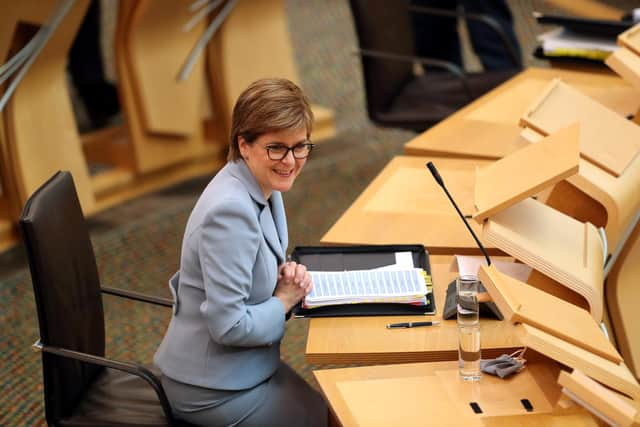Nicola Sturgeon accused of 'sleekit' use of historic data around 2021 exam results
Both leaders of the two biggest opposition parties focused on the growing concerns around the exams systems, with Scottish Conservative leader Douglas Ross accusing the First Minister of presiding over a system that was “sleekit”.
The SNP leader rejected the claims, saying she stood by her statement that historic attainment data of schools would not be used to mark down grades of individual pupils, adding the Scottish Qualifications Authority (SQA) would not change grades once they were submitted to schools.


Advertisement
Hide AdAdvertisement
Hide AdMr Ross used examples from an Education Scotland report and several statements from local authorities, including Edinburgh City Council, which stated that historic data was being used to “make adjustments” to this year’s data.
He said: “Once again young people will lose out based solely on where they go to school. This is the same shambles as last year, it is just more sleekit.
"Instead of the SQA marking pupils down at the end of the process, the system will force teachers and schools to do it first. How on earth can young people have confidence in the system when the First Minister’s words don’t match reality?”
Responding, Ms Sturgeon said the picture painted by the Tory leader was “simply not the case”, adding that historic data would be used as a “quality assurance” method to check grades.
She said if teachers were able to insist their belief a pupil had demonstrated enough evidence for a grade, that grade would stand.
The First Minister said: “If the teacher’s judgement is that they stand behind the result they gave, that result stands, it is not changed. It is simply a checking procedure, but it ends in the same place where it is the teacher’s judgement, based on the attainment of the pupil, that determines the grade.
"That is a world away from the situation last year where algorithms and the past performance of schools automatically changed the performance and the grades of some pupils.
"That is not happening. This is a system based on teacher judgement, evidenced by the work that pupils have actually done throughout the year.”
Advertisement
Hide AdAdvertisement
Hide AdScottish Labour leader Anas Sarwar also focused in on exams, pressing the First Minister on the lack of a ‘no-detriment’ policy, where pupils appealing their grades would be guaranteed their grades would not go down as part of the appeal.
The Glasgow MSP also focused on the lack of a provision for extenuating circumstances as part of the appeals process, raising concerns from the Children’s Commissioner the process may not be human rights compliant.
He said: “This SQA crisis has all the hallmarks of last year’s crisis. The use of historical data in moderation, a non-functioning appeals process, and a government refusing to listen and engage.
"Young people across Scotland have had the hardest year of their lives. You have had a year to develop a system that worked, but there are now just days to improve the flawed process.
"Will the First Minister now finally listen to Scotland’s young people and introduce a no-detriment appeals policy and make personal circumstance part of the appeals criteria, or will young people be forced to take to the streets again this year to force her to change her mind.”
Responding, Ms Sturgeon said the Scottish Government would “continue to listen” to concerns and said “difficult judgements” had been made.
She said: “These are all really important points, but describing an appeals system that hasn’t even started yet as non-functioning I don’t think helps with the delivery of a system and the proper discussion of some of these issues.
"There is no algorithm that is determining young people’s results and I don’t think it is fair to young people to create the impression that there is.
Advertisement
Hide AdAdvertisement
Hide Ad"This is a system based on teacher judgement, that is correct. The appeals system is open to all, free of charge.
"We will continue to listen, we will continue to look at all the detail of this and we will strive to make sure that every young person gets the service from the education system and the exam system that they deserve.”
A message from the Editor:
Thank you for reading this article. We're more reliant on your support than ever as the shift in consumer habits brought about by coronavirus impacts our advertisers.
If you haven't already, please consider supporting our trusted, fact-checked journalism by taking out a digital subscription.
Comments
Want to join the conversation? Please or to comment on this article.
